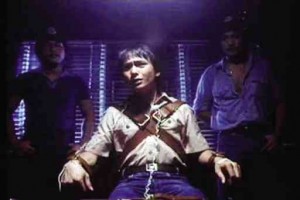Take it from ‘Batch ’81’ writer: ‘Frats never learn’

FOR “BROTHERHOOD” Scenes from the acclaimed film “Batch ’81” lift the heavy veil on violent fraternity rituals and ordeals. The Mike de Leon classic starred Mark Gil (left photo), with the screenplay based on interviews with “informants’’ from the UP-based Upsilon Sigma Phi, according to Clodualdo del Mundo Jr., one of the writers. YOUTUBE VIDEO GRABS
More than three decades ago, “Batch ’81” unsettled local moviegoers and later international audiences with its unflinching depiction of campus fraternity violence. Directed by Mike de Leon and with Mark Gil leading the cast, the film followed the initiation of seven neophytes into the “brotherhood” of Alpha Kappa Omega (AKO).
Recent headlines, however, prompted Clodualdo del Mundo Jr., one of the scriptwriters, to show excerpts of the movie to his film students at De La Salle University. The special classroom viewing centered on the rumble scene—the bloodiest sequence—which pitted the revenge-seeking AKO against a rival frat.
Then and now, Del Mundo finds himself facing the same challenge.

Also considered a metaphor for the Marcos dictatorship, the film lifted the thick veil on fraternity hazing which, long after Batch ’81 became a classic, continued to claim young, promising lives—the latest being that of a student from a school where Del Mundo is a board member.
Article continues after this advertisement“It was such a waste of life,” Del Mundo said of the death of Guillo Cesar Servando, a sophomore from DLS-College of St. Benilde in Manila, who on June 28 succumbed to the injuries he sustained in the initiation rites of the Tau Gamma Phi fraternity.
Article continues after this advertisementThe National Bureau of Investigation later filed complaints against 20 people for Servando’s death and the torture of three other neophytes. The suspects face four years to life imprisonment if found guilty under the 1995 antihazing law.
But even before the Servando case, Del Mundo himself had a distant relative who fell prey to the kind of violence depicted by his screenplay. On March 21 this year, he said, Jacinto Noel Genuino, a Far Eastern University student, was stabbed dead “by opposing frat members” who attacked the victim and his friends as they were walking on España Boulevard, Manila.
“How events conspire to justify murder is just incomprehensible,” he told the Inquirer in an interview.
According to Del Mundo, the material for Batch ’81 was mostly based on interviews with “informants” from Upsilon Sigma Phi (USP), the oldest Greek-letter fraternity in Asia, which is based in the University of the Philippines. (A USP hazing incident that sent a UP student to the hospital came to light days after the Servando case was reported in the media.)
“They told us stories about the essence of fraternities, the idea of brotherhood, the initiation process,” he said. “The main idea is that the individual virtually and willingly loses his identity for the sake of fraternity, for the sake of belonging.”

Looking back, Del Mundo said: “There must have been bad cases of hazing at the time (we filmed it), even deaths caused by hazing. I am just amazed that fraternities have apparently not learned from these past events and experiences.”
“Some cases are simply murder situations. Senseless, crazy and stupid,” he stressed.
Marichu Vera-Perez Maceda, the film’s producer, said she was moved into making an “antifraternity” film by what happened to her own son, then aged 14, who was beaten black and blue by his would-be “brothers.”
One of her friends also had a son who tried to join a fraternity but ended up undergoing a “brain operation” because of his ordeals, Maceda recalled.
On the film’s political undertones, Maceda took note of the hazing scenes where the neophytes were “blindfolded, (stripped) naked and bound while being beaten up and forced to answer their lord and master.”
“It resembled the torture that political prisoners undergo when questioned by authorities,” Maceda explained. “In a dark room with just one light bulb for illumination, you have no choice but to obey and (hope you) give the right answers.” she said.
“Those who are attracted to fraternities value the supposed brotherhood they offer—to the extent of losing individual freedom and identity,” Del Mundo said. “I think it’s still a question of values. What does a person value in his life? A sense of belonging, friendship, connections?”
“Up to what extent do we defend this kind of ‘brotherhood’?” he said. “The film can only do so much. Society has to act upon the issue.”